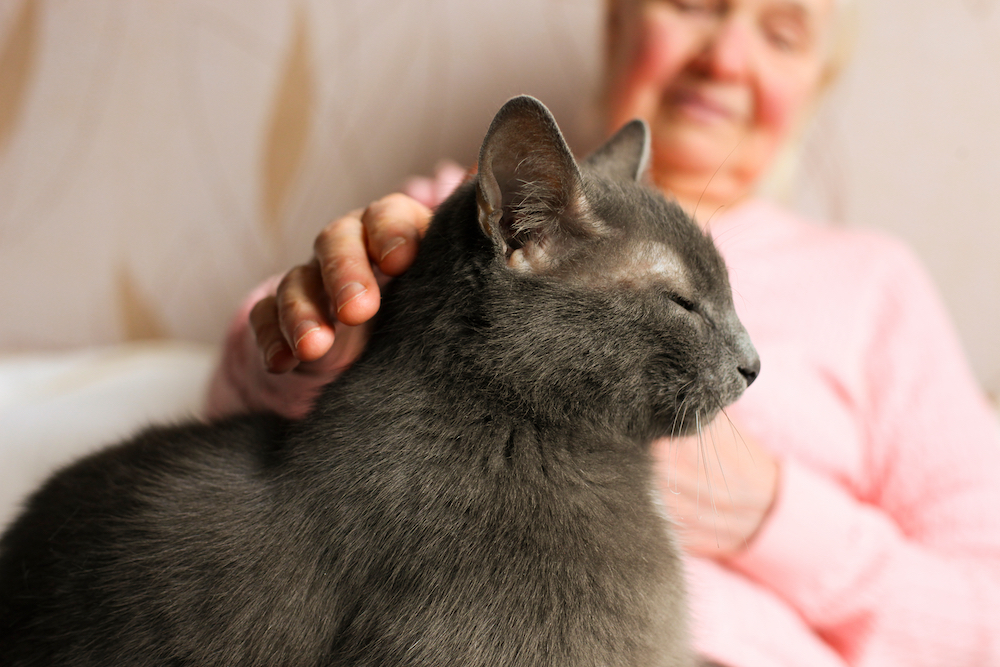Vista Gardens News
Learn more about what’s happening at Vista Gardens Memory Care. Hear stories, learn about new services or events, and get to know what life is like in our community.

8 Ways That Pet Therapy Can Help Memory Care Residents
Pet therapy has been recognized as an effective tool for improving the lives of individuals with various disabilities and health conditions, including those with memory loss and cognitive impairments. Memory care residents, who may struggle with feelings of boredom, loneliness, and anxiety, can greatly benefit from pet therapy at dementia care services near me. Here are ways that pet therapy can help memory care residents.
1.) Reduce Stress and Anxiety
Pet therapy can help to reduce stress and anxiety levels in memory care residents. The presence of a therapy animal can have a calming effect on individuals, helping to relieve feelings of anxiety and agitation. This can be especially helpful for residents who may be struggling with changes in their routine or environment. The physical act of petting an animal can also have a calming effect, as it can lower heart rate and blood pressure. Research has shown that pet therapy can be just as effective as medication in reducing anxiety levels in individuals with various health conditions.
2.) Improve Comfort and Security
In addition, pet therapy can provide a sense of comfort and security for memory care residents. This can be particularly beneficial for those who may be feeling confused or disoriented in their environment. Therapy animals can also serve as a source of comfort and companionship for residents, which can be especially important for those who may have limited opportunities for human interaction. In some cases, therapy animals can help to improve communication skills in residents, as they provide a non-threatening subject for residents to engage with and talk about.
3.) Enhance Social Interaction
Pet therapy can also enhance social interaction among memory care residents. Interacting with therapy animals can provide a common ground for residents to connect with one another and engage in conversation. Therapy animals can also help to break down social barriers and provide residents with a safe and non-threatening environment in which to make new friends and form new relationships. In group pet therapy sessions, residents can work together to care for the therapy animal, such as grooming, feeding, and playing with it, which can foster a sense of teamwork and cooperation.
4.) Improve Physical Health
Physical health can also be improved with pet therapy. Spending time with therapy animals can encourage physical activity and movement, which can help to maintain mobility and improve overall physical health. For example, walking and grooming the therapy animal can provide light exercise and help residents to maintain their strength and balance. Pet therapy can also provide sensory stimulation for residents, helping to keep their minds and bodies active and engaged.
5.) Improve Mood and Well-Being
Another significant benefit of pet therapy for memory care residents is the improvement in their mood and overall well-being. Interacting with animals can provide a sense of joy and happiness for residents, and can stimulate their cognitive and emotional processes. Residents who participate in pet therapy can also experience a sense of accomplishment and boost their self-esteem, which can be especially important for those who may struggle with feelings of boredom, loneliness, and depression. Research has shown that pet therapy can help to reduce symptoms of depression and improve overall quality of life in individuals with various health conditions.
6.) Animal-Assisted Activities Programs
In addition to traditional pet therapy, facilities may also consider incorporating animal-assisted activities into their programs. These activities are designed to provide opportunities for residents to interact with animals in a structured and meaningful way. For example, residents may be able to groom, feed, and play with the therapy animals, or participate in sensory experiences such as petting, holding, and listening to the animals.
Animal-assisted activities can also be used to help residents with memory loss to recall past experiences and memories. For example, reminiscing about past pets or animal-related experiences can help to stimulate the brain and trigger memories, improving cognitive function and enhancing quality of life.
7.) Physical Therapy Animals
Facilities can also incorporate pet therapy into their physical therapy programs, using therapy animals to help residents with mobility issues improve their balance, coordination, and dexterity. For example, residents may be able to walk a therapy dog, which can help to improve their balance and coordination or participate in interactive games with therapy animals, which can help to improve hand-eye coordination.
8.) Pet Therapy Benefits for Staff and Residents
Pet therapy programs can also be beneficial for the staff working in memory care facilities, providing them with opportunities to bond with residents and engage in meaningful interactions. Staff can also benefit from the stress-reducing effects of pet therapy, which can help to improve their overall well-being and enhance their job satisfaction.

Pet Therapy in Senior Living Memory Care
Memory care facilities that incorporate pet therapy into their programs can expect to see a positive impact on the lives of their residents. Pet therapy can help to improve their physical, emotional, and mental well-being, and can provide a sense of comfort and security in their environment. As such, it is a valuable tool for memory care facilities to consider as they strive to provide the best possible care for their residents.
What to Look for With Pet Therapy in Senior Living
It is important to note that pet therapy should be carefully planned and implemented, with the well-being of both the residents and the therapy animals in mind. Therapy animals should be well-trained, healthy, and well-behaved, and facilities should have clear policies and procedures in place to ensure the safety and comfort of all parties involved. In addition, facilities should consider the individual needs and preferences of their residents, as some may have allergies or a fear of animals, while others may have a strong affection for animals.
Can Other Animals Work for Pet Therapy?
Pet therapy is not just limited to dogs, as other therapy animals such as cats, birds, rabbits, horses, and even miniature pigs can also be used to provide comfort and companionship to memory care residents. Each therapy animal has unique characteristics and personalities that can help to engage residents in different ways, making it important for memory care facilities to choose the right animal for their program.
Try Pet Therapy Today!
In conclusion, pet therapy is a powerful tool that can offer numerous benefits to memory care residents, helping to improve their physical, emotional, and mental well-being. By reducing stress and anxiety, enhancing social interaction, providing physical activity, and boosting mood and overall well-being, pet therapy can have a positive impact on the lives of those with memory loss and cognitive impairments.
It is important for memory care facilities to carefully plan and implement pet therapy programs, taking into account the needs and preferences of their residents, and ensuring the safety and comfort of all parties involved. With the right planning and execution, pet therapy can be a valuable addition to dementia care services near me offered by memory care communities, providing residents with a fulfilling and enjoyable experience and helping to enhance their quality of life.
Where can I find Dementia Care Services Near Me?
Look no further than Vista Gardens. Our memory care community is secure, scenic, and pleasant for everyone. Families, staff, and residents enjoy everything we offer, including our distinct outdoor and indoor areas. Your peace of mind is assured within our gated community nestled along the beautiful countryside with 5 acres of landscaped grounds to explore. For information about amenities or other inquiries, please get in touch with us today.
My Mom participates daily at the "breakfast club" in the Ronald Reagan Library, she attends all meal opportunities, watched the daily entertainment in the lobby (singing groups, dancing, etc.) and insists on going on the weekly bus trip out to the community. When I come visit her, she is often in the dining room or walking in the garden... sometimes watching a movie with others in the movie theater. She has always attended church, and on Sundays, Vista Gardens brings in a minister that gives a message. She loves it.
- A Vista Gardens Resident





